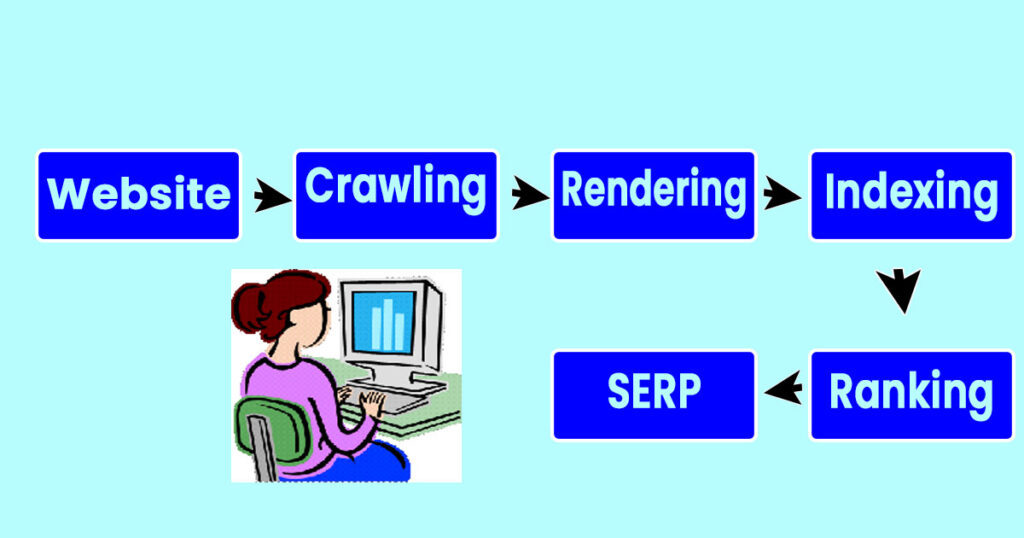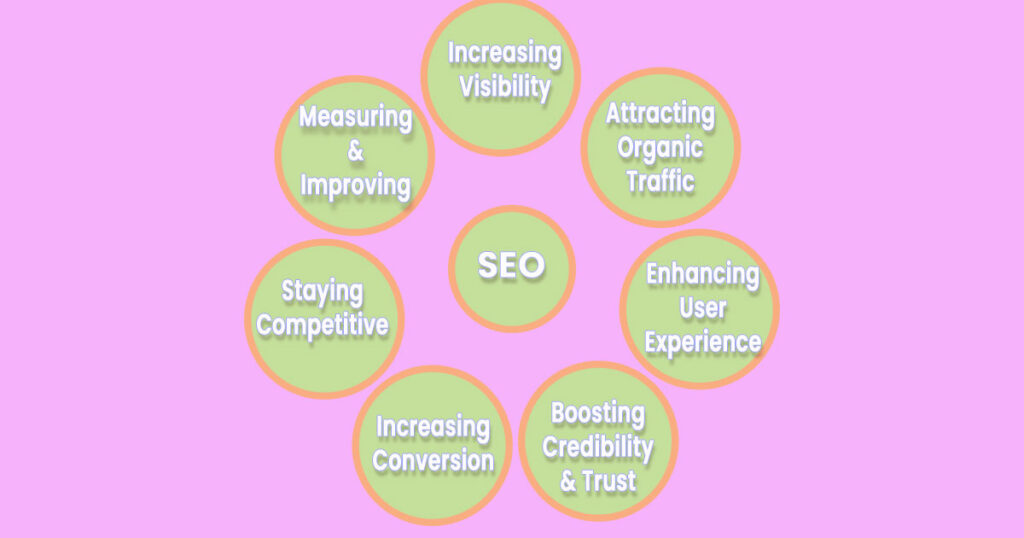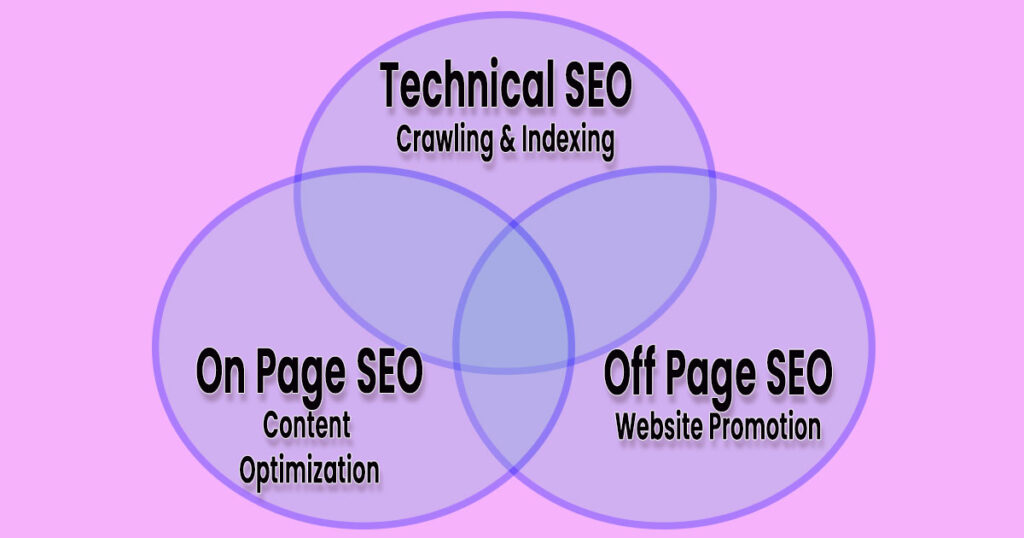Introduction:
SEO (Search Engine Optimization): Search Engine Optimization, abbreviated as SEO, encompasses a collection of practices and strategies with the goal of enhancing a website’s visibility and position within search engine results.

The primary goal of SEO is to increase organic (non-paid) traffic to a website by optimizing various factors that search engines like Google consider when ranking web pages. These factors include optimizing website content, improving site speed and user experience, building high-quality backlinks, and using relevant keywords strategically.
SEO helps websites appear higher in SERPs, making them more likely to attract clicks from users searching for specific information, products, or services.
Now the question arises, what is SERP? (Search Engine Results Page):
SERP, or Search Engine Results Page, is the page that search engines like Google display in response to a user’s search query. It includes a list of search results (usually links to websites) that are deemed most relevant to the user’s query based on various factors, including SEO.
A typical SERP consists of organic search results, paid advertisements, featured snippets, and various rich snippets or information blocks that provide quick answers to common queries. Users typically click on the search results listed on the SERP to access more information about their query.
In summary, SEO is the practice of optimizing a website to improve its ranking on SERPs. When users search for something on a search engine like Google, the SERP displays the most relevant results, and a well-executed SEO strategy can help a website rank higher in these results, ultimately driving more organic traffic to the site.
Before understanding more about SEO, one must know how a search engine like Google works, why it’s necessary to understand it, and whether it can help us earn money or not.
Table of Contents
How Search Engines Work?

Search engines like Google are complex algorithms designed to index and rank web content. When a user enters a search query, the search engine searches its vast database to find the most relevant results.
These results are formed by crawling websites, analyzing content, and using a range of factors to determine their rankings. The goal of any search engine is to provide users with the most accurate and useful information in response to their queries.
Why Does SEO Prioritize Google?
As of 2023, Google stood as the unrivalled leader in the global search engine landscape. With an imposing market share that often exceeded 92.82% in key regions like North America and Europe, Google consistently processed billions of search queries daily, amounting to over 8.5 billion searches per day in 2023 alone.

It commanded a dominant presence in mobile search, with its platform being the primary choice for mobile users. Furthermore, Google’s advertising revenue, primarily driven by its advertising platform, Google Ads, soared to approximately $224.47 billion in 2022. This global reach and pervasive influence solidified Google’s position as the preeminent search engine worldwide.
Google is the dominant search engine globally, with the majority of internet users relying on it for searches. Therefore, SEO efforts often prioritize Google to reach a broad audience and maximize online visibility. Google’s search algorithms are constantly evolving, and staying up to date with their preferences.
What Google wants for his viewers?
Google’s primary goal is to deliver high-quality and relevant content to users. To achieve this, it values factors like website relevance, user experience, mobile-friendliness, and content quality. SEO strategies align with these criteria by optimizing websites to meet Google’s expectations, ensuring a better chance of ranking higher in search results.
How Google Makes Money?

Google primarily generates revenue through advertising, specifically through its advertising platform called Google Ads. Businesses pay to display ads on Google’s search results and partner websites. Advertisers use Google Ads to target users based on keywords, demographics, and browsing behavior. This advertising model has made Google one of the world’s most profitable companies.
The Anatomy of Search Results.
Search engine results pages (SERPs) consist of various elements, including organic search results, paid advertisements, featured snippets, and more. Understanding the composition of SERPs is crucial for SEO professionals, as it informs strategies for gaining visibility within these results.
Before moving ahead with Search Engine Optimization.

Crawling:
This is the first step where search engines explore the web by following links from one page to another. It’s akin to a robot spider (often called a “crawler” or “bot”) navigating the internet’s vast web, visiting websites and their pages.
Rendering:
After crawling, the search engine renders or loads the web pages it visits. This process involves interpreting and displaying the page’s content, similar to how a web browser shows a page to a user. It’s essential for understanding the page’s structure and content.
Indexing:
Once the page is rendered, the search engine analyses its content and stores the information in its database, creating an index. This index is like a massive library catalogue, containing information about all the web pages it has encountered. Indexing helps the search engine quickly retrieve relevant pages when users search for specific terms or phrases.
Ranking:
Finally, when a user enters a search query, the search engine retrieves relevant pages from its index and ranks them based on relevance and quality. Pages that match the query’s intent and are deemed authoritative and trustworthy are presented at the top of the search results, while less relevant or lower-quality pages are ranked lower. This ranking process ensures that users receive the most relevant and useful results for their queries.
Let continue with SEO part.
What is Role of Search Engine Optimization (SEO)?
The role of SEO, or Search Engine Optimization, is to improve a website’s visibility and ranking in search engine results pages (SERPs). SEO involves a range of strategies and techniques aimed at optimizing various aspects of a website, such as its content, structure, and performance. The primary objectives of SEO are:)

- Increasing Visibility: SEO aims to ensure that a website appears prominently in search results when users enter relevant queries. Improved visibility means more potential visitors to the website.
- Attracting Organic Traffic: By optimizing for specific keywords and phrases, SEO helps websites attract organic (non-paid) traffic from users who are actively searching for information, products, or services related to the website’s content.
- Enhancing User Experience: SEO involves improving various elements of a website, such as page load speed, mobile-friendliness, and content quality. This enhances the overall user experience, making it more enjoyable and accessible for visitors.
- Boosting Credibility and Trust: Websites that rank well in search results often appear more credible and trustworthy to users. SEO helps establish authority and reliability within a specific industry or niche.
- Increasing Conversions: Effective SEO doesn’t just attract traffic; it also focuses on converting visitors into customers or leads. By providing valuable content and optimizing conversion paths, SEO contributes to business growth.
- Staying Competitive: In today’s digital world, competition is fierce. SEO helps businesses remain competitive by ensuring their online presence is strong and up-to-date with the latest search engine algorithms and trends.
- Measuring and Improving: SEO is data-driven, and its success can be measured using various metrics and key performance indicators (KPIs). This data helps businesses refine their strategies and make data-backed decisions for continuous improvement.
What are types of SEO?

On-Page Search Engine Optimization (SEO):
On-Page SEO is the cornerstone of mastering Search Engine Optimization (SEO). This artful practice involves optimizing individual web pages to maximize their visibility in search engine results. By meticulously fine-tuning elements such as meta tags, headings, content quality, keyword placement, and internal linking, On-Page SEO orchestrates a symphony that resonates with search engine algorithms. The result? Enhanced rankings, increased organic traffic, and a superior user experience. In the journey towards SEO mastery, mastering On-Page SEO is not just a strategy; it’s the virtuoso’s instrument that can make your online presence sing above the digital noise.
This type focuses on optimizing elements within your website itself, like content, titles, and meta descriptions.
Off-Page Search Engine Optimization (SEO):
Off-Page SEO, the counterpart to On-Page SEO, plays a pivotal role in mastering Search Engine Optimization (SEO). It focuses on strategies outside your website that enhance its authority, credibility, and online presence.
This involves activities like building high-quality backlinks, engaging in social media marketing, and garnering mentions and citations from authoritative websites. Off-Page SEO acts as a vote of confidence from the broader internet community, signaling to search engines that your website is a reputable source.
As an essential element in the SEO, mastering Off-Page SEO is the art of fostering a robust online reputation that can increase changes that your site is in the forefront of search engine rankings, establishing true mastery among the others.
Off-page SEO involves actions outside your website to improve its search engine rankings, such as building quality backlinks from other sites.
Technical Search Engine Optimization (SEO):
Technical SEO is a critical aspect of mastering Search Engine Optimization (SEO). Unlike its content-focused counterpart, Technical SEO dives deep into the mechanics of your website to ensure it’s optimized for search engines.
This involves tasks such as improving site speed, enhancing mobile-friendliness, optimizing site structure, and ensuring efficient crawling and indexing by search engine bots. Technical SEO acts as the invisible force that empowers your website to be easily discovered and comprehensively evaluated by search engines.
By addressing these technical aspects, you not only boost your website’s performance but also lay a strong foundation for content and off-page SEO efforts, ultimately paving the way for SEO mastery in the competitive digital world.
Technical SEO ensures that your website functions smoothly and is easily understood by search engines, involving factors like site speed and mobile-friendliness.
Few fields where SEO specialization is uttermost required.
- Ecommerce SEO: Specializes in optimizing online stores and product pages for better search engine visibility, ultimately driving sales.
- Enterprise SEO: Tailored for large-scale organizations, focusing on managing and optimizing extensive web content and addressing complex technical issues.
- International SEO: Aims to expand a website’s global reach and visibility, optimizing for different countries and languages.
- Local SEO: Targets local businesses, enhancing their visibility in local search results to attract nearby customers.
- News SEO: Specific to news websites, it ensures timely indexing and prominent placement of news articles in search results.
Conclusion:
In the ever-evolving digital world, mastering Search Engine Optimization (SEO) is not merely a skill; it’s a journey of continuous learning and adaptation.
SEO isn’t as complicated as it may seem at first glance. It’s more like a helpful guide that ensures your website gets noticed by the right people. By understanding keywords, creating fantastic content, and following some best practices, you’ll be well on your way to mastering the art of SEO. So, embrace it, and let your website shine in the digital universe!
